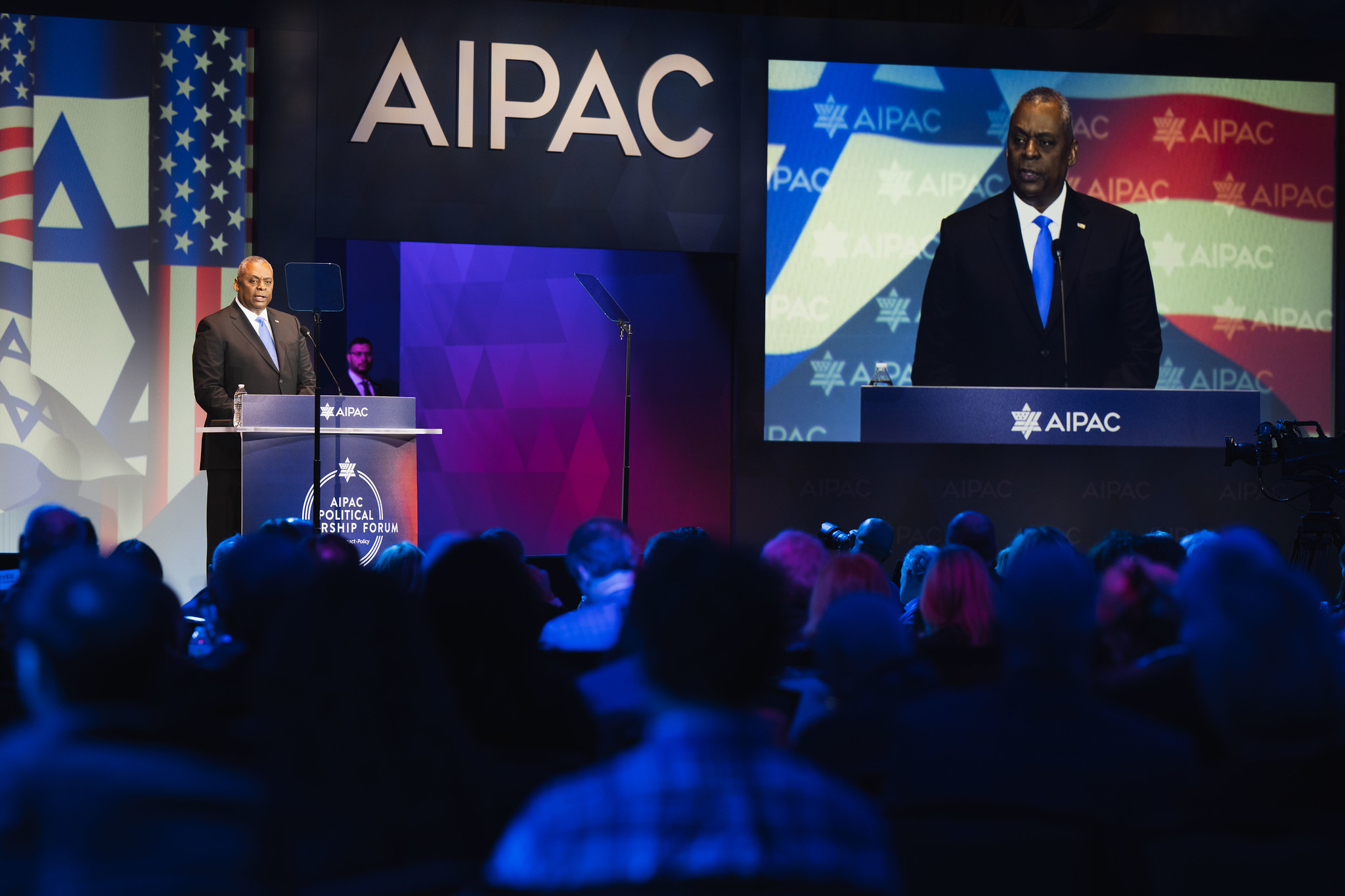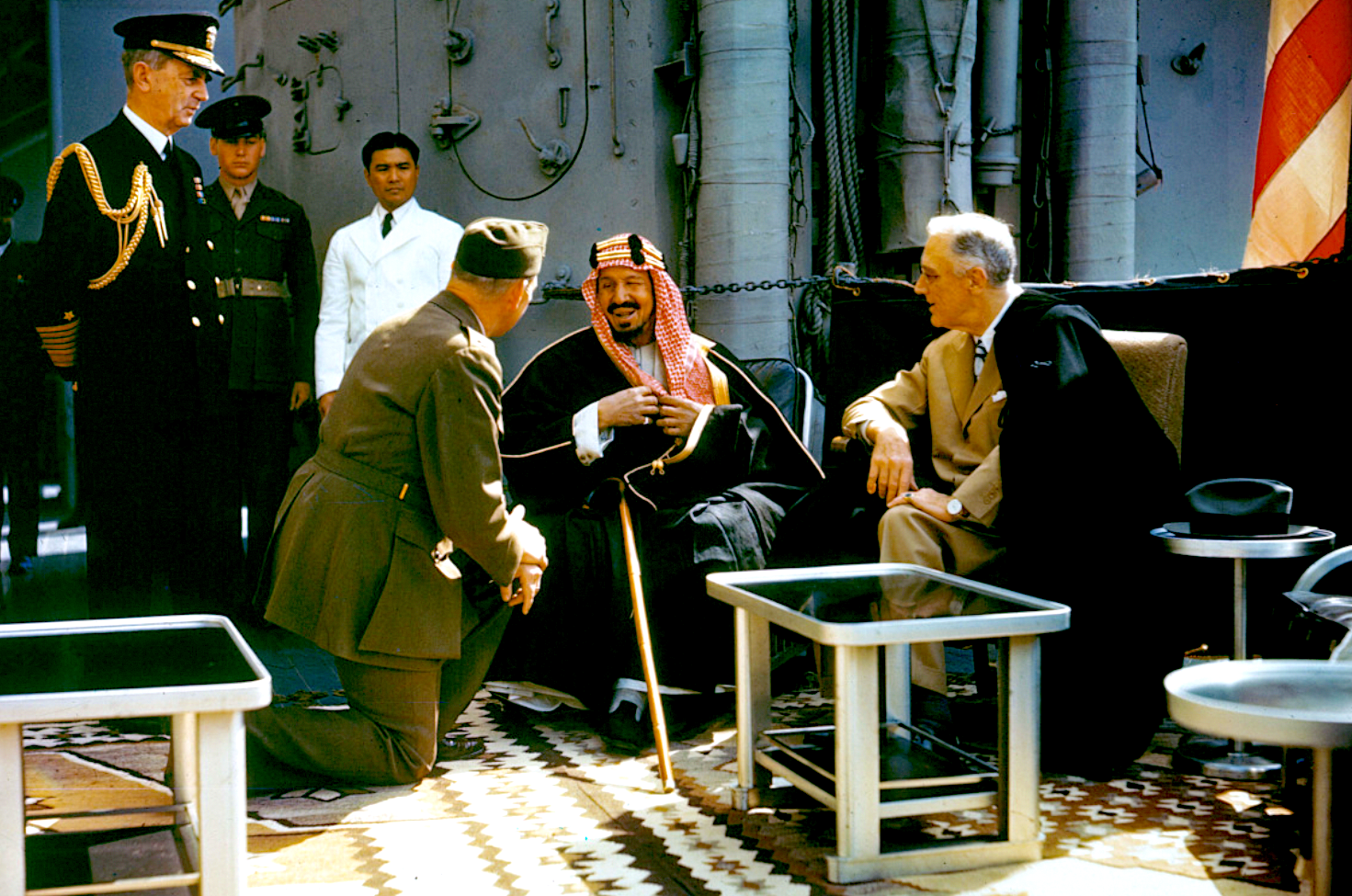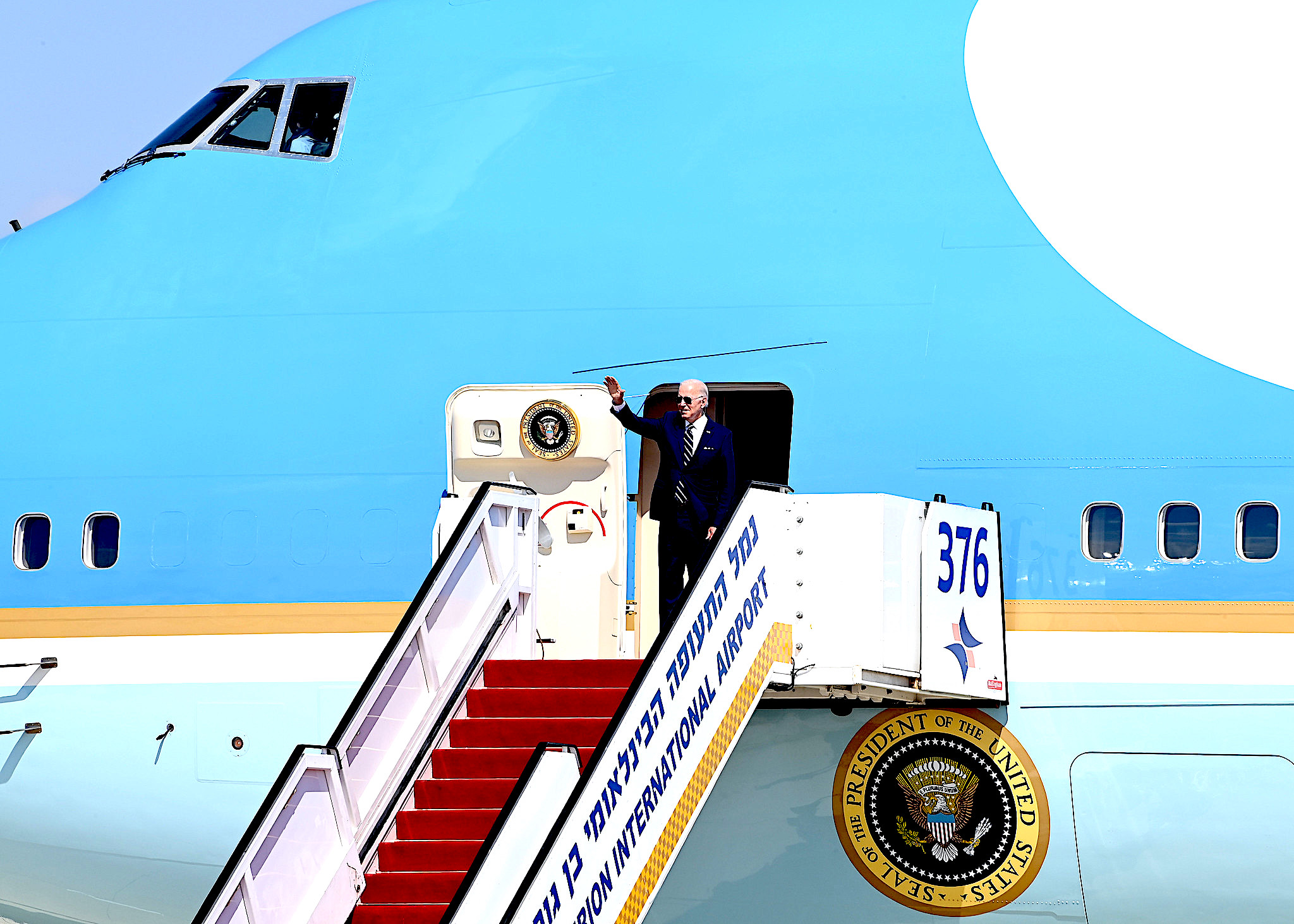The Myth of Israel as ‘US Aircraft Carrier’ in Middle East
The Myth of Israel as ‘US Aircraft Carrier’ in Middle East
If Israeli apartheid were to disappear, oil and trade would still flow from the Middle East towards the West, write Jean Bricmont and Diana Johnstone.
By Jean Bricmont and Diana Johnstone
Special to Consortium News
Why does the United States give total support to Israel?
In answer, there is a common myth shared by both champions and radical critics of the Zionist state which needs to be dispelled.
The myth is that Israel is a major U.S. strategic asset, described as a sort of unsinkable American aircraft carrier vital to Washington’s interests in the Middle East.
The line of argument of those who share this myth is to show that the United States has economic and strategic interests in the oil-rich Middle East (which nobody denies) and to quote American (and, of course, Israeli) political figures who claim that Israel is the best or even the sole U.S. ally in the region.
For example U.S. President Joe Biden has gone so far as to say that if Israel didn’t exist the U.S. should have invented it.
But the crucial evidence, totally missing from their analysis, is the slightest example of Israel actually serving American interests in the region.
If no examples are given, it’s simply because there are none. Israel has never fired a shot on behalf of the United States or brought a drop of oil under U.S. control.
We can start with a common sense argument: If the U.S. is interested in Middle East oil, why would it support a country that is hated (for whatever reasons) by all the populations of the oil producing countries?
In the 1950s, such was the reasoning of most U.S. experts, who put good relations with Arab countries ahead of support to Israel. This no doubt helps explain why AIPAC, the American Israel Public Affairs Committee, was founded in 1963, to align U.S. policy with that of Israel.
1967 War & After
U.S. support for Israel took off after the 1967 war. Israel’s success dealt a fatal blow to the Arab nationalism embodied by Egypt’s Gamal Nasser, which some U.S. policy-makers falsely saw as a potential communist threat (which they saw just about everywhere).
But the war was waged by Israel for its own interests and expansion, with no benefit to the United States.
On the contrary: a remarkable official silence has been maintained over the fact that in the course of that short war, the American intelligence gathering ship USS Liberty, which was spying on the conflict, was shelled for several hours by the Israeli air force, with the obvious intention to sink it, killing 34 sailors and wounding 174.

Damage to USS Liberty, June 1967. (Wikimedia Commons, Public Domain)
Had there been no survivors, Egypt could have been accused (making it a “false flag” operation). The survivors were ordered not to speak about it, and the incident was never fully investigated, accepting the official Israeli explanation that it was a “mistake.” In any case, Israel’s behavior was not exactly that of a precious ally.
When Israel attacked Lebanon in 2006, that country’s government was perfectly “pro-Western.” What’s more, during the 1991 war against Iraq over Kuwait, the United States insisted that Israel should not participate, because such involvement would have collapsed their Arab anti-Iraq coalition. Again, it’s hard here to see Israel as an indispensable “ally.”
U.S. post-9/11 wars have targeted Israel’s enemies — Iraq, Libya, Syria — with no advantage to U.S. oil companies, on the contrary. The question arises whether the U.S. choice of enemies in the Middle East has not been determined by the interests of a foreign government, contrary to American interests in the region.
Washington & Gaza Today
Now we come to the current situation: what interest does the United States have in the slaughter being perpetrated in Gaza?
In reality, what Washington is doing is trying to maintain good relations with their Arab allies (Egypt, Saudi Arabia, the Gulf States) by pretending to seek a compromise while exerting no effective pressure on Israel – for instance, by cutting off funds.
And why don’t they? The answer is obvious but saying so is politically incorrect, and is rarely discussed by defenders of the myth, except to refute it. It is the action of the pro-Israeli lobby, which de facto controls Congress and without which no president can really act.
[See: Israel Lobby’s Disastrous Domination]
The lobby is no secret conspiracy. It is openly coordinated by AIPAC, which spreads billionaire donations throughout the U.S. political system and dictates the line to take on Israel to ensure a successful career.

Outside annual AIPAC meeting in Washington, March 2016. (Susan Melkisethian, Flickr, CC BY-NC-ND 2.0)
Control is virtually complete over the two parties represented in Congress.
It is achieved primarily through the funding of election campaigns. All those who comply can count on campaign donations, while anyone daring to defy the lobby’s injunctions would quickly be challenged by a very well-funded opponent in the next primary election, thus losing support of his or her own party in the next election — as happened to Georgia representative Cynthia McKinney in 2002.
[See: Zionist Suppression in Congress and US Congress: ‘We Stand With Genocide’]
The lobby also animates smear campaigns against any critic of Israel, as seen recently in the attacks on university presidents (Harvard, MIT, Pennsylvania) for not having sufficiently cracked down on alleged student “anti-Semitism” on their campuses.
There are several books that explain in detail how the lobby works:
- They Dare to Speak Out: People and Institutions Confront Israel’s Lobby (1985) by Paul Findley, a Republican congressman from Illinois, who details how the lobby politically “liquidated” all those who wanted a different policy in the Middle East, precisely because they wanted to defend the interests of the United States.
- The Israel Lobby and U.S. Foreign Policy, by John Mearsheimer and Stephen Walt (2007) a comprehensive and well sourced book on the functioning and the effects of the lobby.
- Against Our Better Judgment : The hidden history of how the U.S. was used to create Israël, by Alison Weir, 2014, which goes back to the Balfour declaration.
One can also watch hidden-camera reports by Al Jazeera on the lobby’s work in the U.S. and Britain.
The way the Labour Party leader Jeremy Corbyn was “eliminated” politically rests entirely on the lobby’s action and campaigns against his (imaginary) anti-Semitism. The same process is currently underway in France with Jean-Luc Mélenchon and his France Insoumise party.
American presidents as different as Richard Nixon and Jimmy Carter have complained that their actions were hampered by the lobby. In fact, every American president has wanted to get rid of the “Palestinian problem” (through the two-state solution) but has been impeded by Congress.
As for Congress itself, let us quote very explicit insider testimony, that of James Abourezk, who was first a congressman and then a senator from South Dakota in the 1970s and who sent this letter in 2006 to Jeff Blankfort, an anti-Zionist activist:
“I can tell you from personal experience that, at least in the Congress, the support Israel has in that body is based completely on political fear — fear of defeat by anyone who does not do what Israel wants done. I can also tell you that very few members of Congress — at least when I served there — have any affection for Israel or for its Lobby. What they have is contempt, but it is silenced by fear of being found out exactly how they feel.
I’ve heard too many cloakroom conversations in which members of the Senate will voice their bitter feelings about how they’re pushed around by the Lobby to think otherwise. In private one hears the dislike of Israel and the tactics of the Lobby, but not one of them is willing to risk the Lobby’s animosity by making their feelings public.
Thus, I see no desire on the part of Members of Congress to further any U.S. imperial dreams by using Israel as their pit bull. The only exceptions to that rule are the feelings of Jewish members, who, I believe, are sincere in their efforts to keep U.S. money flowing to Israel.”
AIPAC Suppression
Abourezk added that the Lobby made every effort to suppress even a single voice of congressional dissent – as his own – that might question annual appropriations to Israel, so that
“if Congress is completely silent on the issue, the press will have no one to quote, which effectively silences the press as well. Any journalists or editors who step out of line are quickly brought under control by well organized economic pressure against the newspaper caught sinning.”
Abourezk once traveled through the Middle East with a reporter who wrote honestly about what he saw. As a result, newspaper executives received threats from several of their large advertisers that their advertising would be terminated if they continued publishing the journalist’s articles.

Abourezk circa 1977. (Handout photo, Wikimedia Commons, Public domain)
“I do not recall a single instance where any administration saw the need for Israel’s military power to advance U.S. Imperial interests. In fact, as we saw in the Gulf War, Israel’s involvement was detrimental to what Bush, Sr. wanted to accomplish in that war. They had, as you might remember, to suppress any Israeli assistance so that the coalition would not be destroyed by their involvement.
So far as the argument that we need to use Israel as a base for U.S. operations, I’m not aware of any U.S. bases there of any kind. The U.S. has enough military bases, and fleets, in the area to be able to handle any kind of military needs without using Israel. In fact I can’t think of an instance where the U.S. would want to involve Israel militarily for fear of upsetting the current allies the U.S. has, i.e., Saudi Arabia and the Emirates. The public in those countries would not allow the monarchies to continue their alliance with the U.S. should Israel become involved.”
Abourezk said that U.S. encouragement in its invasions of Lebanon “was merely an extension of the U.S. policy of helping Israel because of the Lobby’s continual pressure. … Lebanon always has been a ‘throw away’ country so far as the Congress is concerned, that is, what happens there has no effect on U.S. interests. There is no Lebanon Lobby.”
“The public must realize that far from being an asset, Israel is a chronic liability that squanders billions of American dollars, drags the United States into wars and whose genocidal treatment of the Palestinians is radically destroying America’s moral pretensions in most of the world.”
Alleged Strategic Value
The alleged strategic value of Israel is just one among many examples of claiming that some imperial/colonial project is necessary for the global capitalist system.
The Vietnam war was justified in part by the domino theory: all of South-East Asia would become communist if Vietnam “fell.” The only domino that fell was Cambodia, as a result of U.S. bombing, after victorious Vietnam intervened to overthrow a genocidal regime there.
South African apartheid was supported by the West, in part out of fear of communism, but the end of apartheid had no dramatic effect on capitalist imperialism in Africa.
If Israeli apartheid were to disappear in Palestine, oil and trade would still flow from the Middle East towards the West, and there would be no attempts by Houthis to block shipments in the Red Sea.
A realistic analysis shows that Israel’s treatment of Palestinians and aggressive policies toward its neighbors are entirely detrimental to American interests in the Middle East, which the current crisis only serves to highlight even more.
The trouble with the “Israel as U.S. aircraft carrier” thesis is that while it’s very comfortable for its defenders, it is also very damaging for the Palestinian cause.
It’s comfortable because it doesn’t risk incurring accusations of anti-Semitism, as it shifts responsibility for Israeli atrocities to American imperialism and its multinational corporations.
On the other hand, if you emphasize the Lobby’s leading role in U.S. Middle East policy, you will be accused of echoing fantasies and “conspiracy theories” about “Jewish power” dating from times when there was no Israel and thus no Israel Lobby.
Rejection of discredited stereotypes is no reason to ignore the facts of the unprecedented relationship that has developed between the United States and Israel.
Harm to Palestinian Cause
The “Israel as U.S. aircraft carrier” is precisely an Israeli argument designed to win over total U.S. political, financial and military support.
Thus it is no wonder that echoing that argument is extremely harmful to the Palestinian cause. If it were true, how could we hope to end this American support to Israel?
Persuade the American population to revolt against something said to be highly beneficial to U.S. interests? Or wait for American imperialism to collapse? That’s not likely to happen any time soon.
But if the power of the lobby is the key to U.S. support, then the strategy to be followed is much simpler and has a much greater chance of success: we need simply to dare speak out and tell the truth.
The public must realize that far from being an asset, Israel is a chronic liability that squanders billions of American dollars, drags the United States into wars and whose genocidal treatment of the Palestinians is radically destroying America’s moral pretensions in most of the world.
Once this is understood, support for Israel will collapse, and voters may put enough pressure on the national elite, the administration and even the intimidated Congress to reorient U.S. policy in line with genuine national interests.
There are signs that part of the economic ruling class is moving this way: Elon Musk’s defense of free speech on social networks is a step in the right direction (to the rage of Israel’s supporters).
Although Donald Trump, as president, did all he could for Israel, his popular slogan “America First” means something quite different, as understood by anti-interventionists on the right such as Tucker Carlson.
Unfortunately, many on the left cling to an ostensibly “Marxist” view that U.S. support for Israel must be motivated by economic interests, by capitalist profits, by control of the flow of Middle Eastern oil. This belief is not only unsupported factually, it amounts to an invitation to U.S. rulers to keep it up.
With worldwide indignation rising against the genocidal assault on Gaza, how is it possible for any American to claim that Israel is “acting in American interests?” Israel is responsible for its crimes, and it is both true and in the U.S. national interest to recognize that far from being a strategic asset, Israel is America’s No. 1 liability.
Source: Consortium News
The Debate Over Israel as ‘US Aircraft Carrier’
Diana Johnstone responds to readers’ comments on “The Myth of Israel as ‘US Aircraft Carrier,” an article she recently co-authored with Jean Bricmont.

U.S. Defense Secretary Lloyd Austin addressing an AIPAC forum in Washington, D.C., Jan. 10, 2023. (DoD, Alexander Kubitza)
By Diana Johnstone
Special to Consortium News
 As was to be expected, considering the extreme complexity of the U.S.-Israel relationship, our recent article on “The Myth of Israel as ‘US Aircraft Carrier’ in Middle East,” far from settling this controversial issue, aroused numerous objections. We see these disagreements as an invitation to respond, in the hope that a friendly debate can contribute to clarifying the issues.
As was to be expected, considering the extreme complexity of the U.S.-Israel relationship, our recent article on “The Myth of Israel as ‘US Aircraft Carrier’ in Middle East,” far from settling this controversial issue, aroused numerous objections. We see these disagreements as an invitation to respond, in the hope that a friendly debate can contribute to clarifying the issues.
The Aircraft Carrier Image
A reader directly asks us “what individual or entity is the quotation ‘The Myth of Israel as “US Aircraft Carrier” in Middle East’ borrowed from or attributed to?”
There is no single answer, inasmuch as this image is used quite frequently, originally by advocates of the U.S.-Israel alliance, to justify it. That the Zionists make this claim is to be expected, and is no more credible than their other claims.
Our questioning of that expression is directed primarily at pro-Palestinian friends, usually on the left who accept and spread the belief that Israel is a U.S. “strategic asset,” usually meaning it contributes to U.S. control of Middle East oil.
This assumption is often based on the notion that a capitalist power must act in its own economic interest, and thus could not be fooled by ideology or bribery into acting against its own interests.
Not wanting to engage in ad hominem attacks on commentators with whom we largely agree on just about everything else, we have been reluctant to name names. But here goes: a perfect example is a recent interview with the excellent economist Michael Hudson by Ben Norton. Both identify as Marxist. Their interview is titled “Israel as a Landed Aircraft Carrier.”
Norton introduces his interview by citing Biden’s notorious declaration, “if there were not an Israel, we would have to invent one.”
Michael Hudson takes up the theme. He stresses that U.S. support to Israel, is “not altruistic” (no doubt), and provides his own explanation.
“Israel is a landed aircraft carrier in the Near East. Israel is the takeoff point for America to control the Near East…The United States has always viewed Israel as just our foreign military base…”
His initial justification for this statement is historic.
“When England first passed the act saying that there should be an Israel, the Balfour Declaration, it was because Britain wanted to control the Near East and its oil supplies…”
However, we maintain that the reasons for the Balfour Declaration (discussed at length in the book by Alison Weir that we cite) are long out of date and cannot explain current U.S. official devotion to Israel.
By the time Israel came into being, after World War II, the U.S. had effectively taken control of the region and its oil sources and had no particular interest in Israel.

Saudi King Ibn Saud converses with FDR (right) through an interpreter, Feb. 14, 1945, on board the USS Quincy, in the Suez Canal, during which U.S. secured Saudi oil flows in exchange for U.S. security guarantees. (U.S. Navy/Wikimedia Commons)
Hudson’s second justification is a generalization about U.S. imperialism:
“And that’s really the U.S. strategy all over the world; it’s trying to fuel other countries to fight wars for its own control.”
But in fact, the fighting and dying in the Middle East has been done by the United States itself and certain NATO allies, while the only people Israeli soldiers are actively fighting are the Palestinians, whose destruction provides no advantage to the United States.

Uzi Arad in 2011. (Harald Dettenborn, Wikimedia Commons, CC BY 3.0 de)
Hudson’s third justification is an anecdote. From his work at the Hudson Institute, he became a close associate of Israeli Prime Minister Benjamin Netanyahu’s main national security adviser, Uzi Arad. Once they were together at a party in San Francisco, and
“one of the U.S. generals came over and slapped Uzi on the back and said, ‘you’re our landed aircraft carrier over there. We love you.’ ”
So that is what a U.S. general said, and probably believed. It is certainly what the Israeli lobby has been telling the Americans for a long time, to justify all that money and military aid. But is it true?
Perhaps one can say that Israel is an aircraft carrier salesman who never delivers the aircraft carrier. Because Israel for a long time has had the rare privilege of NOT housing a U.S. military base, or at least not housing it openly.
Only in 2017, the U.S. and Israel revealed the inauguration of “the first American military base on Israeli soil,” which the U.S. military said was not an American base but merely living quarters for U.S. personnel working on a secret Israeli radar site in the Negev desert evidently spying on Iran. This facility serves Israeli defense interests. Some aircraft carrier!
And all through the Middle East, the U.S. has its own floating aircraft carriers, as well as great big genuine, non-floating military bases. The largest is Al Udeid Air Base in Qatar, and there are important military bases in Bahrain, Kuwait, Saudi Arabia and the United Arab Emirates.
Netanyahu as Zelensky
However, Hudson’s argument does not in fact explain how Israel serves U.S. purposes as a military asset, as an “aircraft carrier” in the sense of an unsinkable military base which the U.S. can use to attack its enemies. Rather, Hudson sees Israel as an expendable pawn, a puppet used by Washington to trigger a war that the U.S. wants to wage against Iran, to the ruin of Israel itself.
Hudson sees Netanyahu as “the Israeli version of Zelensky in the Ukraine.” Just as the U.S. used Ukraine to provoke Russia, the United States pushes Netanyahu to escalate against Gaza so that he will provoke Hezbollah to come to the aid of the Palestinians, and since Hezbollah is described as an Iranian proxy, this will be the excuse for the U.S. to go to war against Iran.

March 21, 2019: Netanyahu on phone with U.S. President Donald Trump during a visit by U.S. Secretary of State Michael Pompeo to Jerusalem. (U.S. State Department/Ron Przysucha)
Hudsdon said:
“The whole world has noticed that the U.S. now has two aircraft carriers in the Mediterranean, right off the Near Eastern shore, and it has an atomic submarine near the Persian Gulf…. And it’s very clear that they’re there not to protect Israel, but to fight Iran. Again and again, every American newspaper, when it talks about Hamas, it says Hamas is acting on behalf of Iran….
America isn’t trying to fight to protect Ukraine. It’s fighting for the last Ukrainian to be exhausted in what they’d hoped would be depleting Russia’s military. …Well, the same thing in Israel. If the United States is pushing Israel and Netanyahu to escalate, escalate, escalate, to do something that at a point is going to lead [Hezbollah leader Hassan] Nasrallah to finally say, ‘okay, we can’t take it anymore.
We’re coming in and helping rescue the Gazans and especially rescue the West Bank, where just as much fighting is taking place. We’re going to come in.’ And that’s when the United States will then feel free to move not only against Lebanon, but all the way via Syria, Iraq, to Iran.”
So this implies that the U.S. military and civilian strategists are eager to find an excuse to go to war with Iran, after having failed to gain full control of Iraq, Libya, Afghanistan or Syria after attacking them militarily (with help from certain NATO allies, but not from Israel). And Iran is a much more formidable power than any of those.
Meanwhile, the U.S. Armed Forces are having difficulty in recruitment (although they may be counting on filling the ranks with some of the undocumented immigrants flooding across the southern borders). Bogged down in Ukraine, preparing for conflict with China, are U.S. leaders really eager to get into a major war with Iran?
This speculation raises the key question raised by a number of Consortium News readers: what is meant by the U.S. national interest?
The National Interest
As we anticipated, there are readers on the left who interpret our appeal to “the national interest” as proof that we are defenders of capitalism. One reader writes: “The defense of capitalism in this article is truly bewildering. The authors conflate U.S. interests with Corporate interests.” That conflation is being done by the reader who assumes that “national interest” cannot be diversely defined.
Our position is simple. We are not aware of any realistic prospect for abolishing the American capitalist system in the foreseeable future, even though there are many symptoms of its radical decline both domestically and in international relations. This decline is due largely to the way the “national interest” is currently defined and pursued.
“This assumption is often based on the notion that a capitalist power must act in its own economic interest, and thus could not be fooled by ideology or bribery into acting against its own interests.”
Our view is that even under capitalism, some policies are better or worse than others. When it comes to the urgency of the survival of the Palestinian people, or more broadly, of sparing humanity the devastation of nuclear war, prudent policies are worth the risk of benefiting some less harmful branches of capitalism in some way.
Although the political system is largely paralyzed, there exist contrary ways of defining the national interest, and some are more perilous for the future of humanity than others.
The current policies that define the official “national interest” in the United States did not spring forth from a unanimous understanding or scientific analysis of what is best for capitalist profit or for anything else. The current ruling foreign policy doctrine is the product of specific influences and individuals that can be named and identified.
To be precise, the “national interest” that is being pursued by the current administration both on the elected top and especially the deep state below is a theoretical construct that has been created by the convergence of two powers that have excluded their rivals from the process.
These two powers are the military-industrial complex and the intellectual branch of the Zionist lobby, known as the “neoconservatives.”
The Lobby as Policy Maker

Biden in Israel, July 2022. (U.S. Embassy Jerusalem, Flickr, CC BY 2.0)
U.S. foreign policy has encountered moments where positive change was possible: after withdrawal from Vietnam, and even more, after the collapse of the Soviet Union. At that point, all the interests linked to the military industrial complex were under threat from the prospect of a “peace dividend” involving substantial disarmament.
What was needed was a fresh ideological justification for the MIC, and this was provided by the growing influence of the privately-financed think tanks that began their takeover of foreign policy definition in the 1970s.
In the following decades, these institutions came under the decisive influence of Zionist donors such as Haim Saban, Sheldon Adelson and AIPAC itself, which founded the Washington Institute for Near East Policy. These think tanks provided echo chambers for pro-Israel neocon intellectuals to shape editorial policy of major liberal media as well as foreign policy itself.
Here is the point: current U.S. policy is not the natural expression of “capitalist corporate interests,” but rather is the product of that process, of the deliberate takeover of U.S. foreign policy by a highly motivated, coherent and talented group of intellectuals, some with dual U.S.-Israeli citizenship. This policy has a name: the Wolfowitz Doctrine.
The Wolfowitz Doctrine & PNAC
The text is available on internet and speaks for itself. It was written as the initial version of the Defense Planning Guidance for the 1994–1999 fiscal years in the office of Under Secretary of Defense for Policy, Paul Wolfowitz, an ardent Zionist.
The version leaked to The New York Times in March 1992 was officially toned down after it caused an uproar, but it has remained as the guidelines for aggressive U.S foreign policy ever since.
Basically, the doctrine announces that the main objective of the United States is to retain its status as the world’s only remaining superpower. No serious rival must be allowed to develop.
This amounts to decreeing that history has come to a stop, and denies the natural historical process whereby China, for instance, which in the past was a leading power, must not be allowed to resume that status.

Wolfowitz during a press conference at the Pentagon on March 1, 2001. (DoD photo by R. D. Ward)
In 1997, neocons William Kristol and Robert Kagan founded the “Project for the New American Century” with the clear purpose of defining U.S. foreign policy in line with the Wolfowitz Doctrine.
As the “world’s pre-eminent power,” the United States must “shape a new century favorable to American principles and interests.” This was to be done neither by virtuous example nor by diplomacy, but by military strength and the force of arms.
PNAC members including Vice President Dick Cheney, Donald Rumsfeld and Wolfowitz took control of policy under President George W. Bush and have kept it ever since.
Inside one administration after another, Robert Kagan’s wife, former Cheney aide Victoria Nuland (who last week said she would be resigning her State Dept. position) has advanced the neocon agenda, notably by managing the Ukrainian disaster. PNAC dissolved itself in 2006, announcing that its job was done.
This job amounted to linking the powerful military industrial complex to the global extension of U.S. power that was turned first and foremost against Israel’s Arab neighbors, starting with Iraq.
This branch of the Lobby, inside the government itself and mainstream media, on the false claim that Iraq was a dangerous enemy of the U.S., got the U.S. to attack and destroy a regime that was in fact an enemy of Israel.
The U.S. was fighting on Israel’s behalf, not the other way around.
The neoconservatives have designed the policy which AIPAC pays members of Congress to support. Every senator has taken AIPAC money.
National Interests Can Be Redefined
The Wolfowitz doctrine is expressed in Nuland’s anti-Russian Ukrainian policy as well as in the American provocations surrounding Taiwan. These policies are not inevitable, even under capitalism.
The expansion of NATO, as an example, was firmly opposed by a generation of U.S. foreign policy experts who have been sidelined and expelled from the policy-making process by the triumphant neocons.
Some are still alive, and others can emerge. So it is neither far-fetched nor “pro-capitalist” to suggest that a more realistic, less arrogant and belligerent foreign policy might be possible.
Such a change cannot be easy, but may be favored precisely by growing recognition of the multiple failures of the reigning neoconservative foreign policy.
For this, a free debate is necessary, in which it is possible to challenge the role of the Lobby without being accused of plagiarizing the Protocols of the Elders of Zion.
It is obvious that in the United States, where this debate is most significant, there are Zionists who are not Jewish, while a very large proportion of the Jewish population is highly critical of Israel and has nothing to do with the Lobby.
The government in Jerusalem proclaiming itself “the Jewish State” as it slaughters native Palestinians is responsible for any current rise in misguided anti-Jewish feelings, which that government blatantly exploits to attract Jewish immigrants from France and New Jersey, in particular.
A reader suggests: “Some folks may find it emotionally and psychologically comforting to blame The Lobby and Israel for the evil of U.S. foreign policy, and somehow the good ol USA is an unwitting victim.”
Can’t we more accurately suggest: “Some folks may find it emotionally and psychologically comforting to blame the U.S. foreign policy for everything rather than risk the inevitable furious reactions to any mention of the Lobby and Israel?”
“The U.S. was fighting on Israel’s behalf, not the other way around.”
Certainly U.S. foreign policy is responsible for everything it does, and that is a gigantic evil. But that does not mean that everyone else is totally innocent.
The Lobby is most certainly responsible for doing all it can to encourage the very worst tendencies in U.S. arrogant exceptionalism, the MIC, Islamophobia and Christian evangelical fantasies, when they can be used against Israel’s adversaries.
And we maintain that encouraging the worst tendencies is not in the American interest.
Source: Consortium News
Comments
Post a Comment